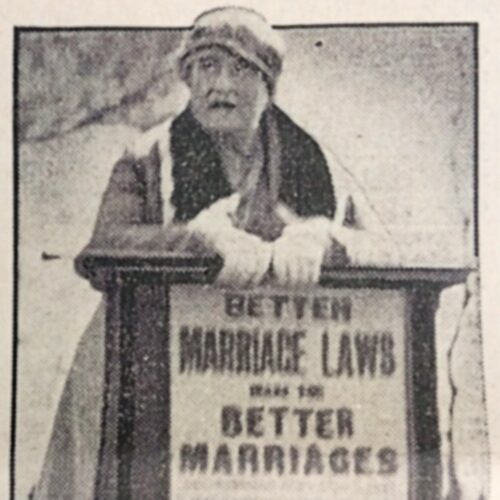

If the basic cause of an unsuccessful marriage is removable, conciliation is the proper procedure. If it is not removable, elementary justice and common sense demands that the pair should be divorced.
May Seaton-Tiedeman
May Seaton-Tiedeman was a tireless campaigner for divorce reform, motivated by deeply felt humanist values to challenge what she felt were legal and moral injustices. A driving force in the Divorce Law Reform Union, she was also an active part of the Union of Ethical Societies (now Humanists UK), acting as treasurer, vice-chair of the council, and twice chairing its annual congress. Seaton-Tiedeman epitomised the progressive values of the ethical societies, and was clearly at home in the humanist movement. As a champion of reform in areas unduly governed by Christian concepts of morality, she anticipated much of the work which sits central to Humanists UK today.
May Louise Seaton was born in Boston, Massachusetts, moving to England with her family in her teens. In 1886, she married Dutch journalist and editor Frederick Henry Lewis Tiedeman, with whom she had one son, and the couple’s wide circle of friends included many writers and reformers. After thirty years of marriage, Frederick died in 1915, and the following year May married long-time family friend Edward Woolf-Abrams. This too would be a long and happy marriage, ending with Edward’s death in 1945.
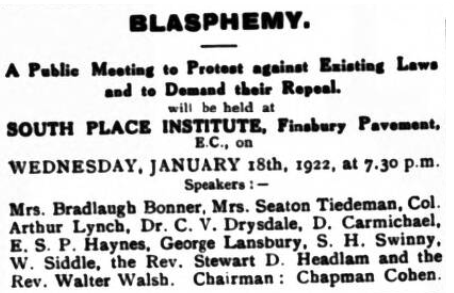
The Divorce Law Reform Union, to which she devoted so much of her time, had for its figureheads Arthur Conan Doyle and Lord Birkenhead, but it was acknowledged even at the time that Seaton-Tiedeman was the group’s driving force. A.P. Herbert, whose Matrimonial Causes Bill shepherded in some of the key reforms sought by the Union, described her as a ‘brave fighter’, who kept ‘her little Union alive with hardly any resources.’ Seaton-Tiedeman was the editor of the Union’s quarterly paper, The Journal (1919-1931) and spoke widely on its causes.
It was not any marital disharmony of her own which compelled Seaton-Tiedeman to pursue divorce reform so fiercely. As Cordelia Moyse has written:
She was not motivated by personal experience of an unhappy marriage, but rather by her belief that immorality, injustice, and unnecessary human suffering were not to be tolerated. A member of the Ethical Union, her secular humanism found its fullest expression in the divorce reform movement not least because the primary ideology of opponents of reform was Christianity.

Following the passing of the Matrimonial Causes Act 1937, which extended the grounds for divorce to include cruelty, desertion and incurable insanity, Arthur Denner Howell Smith (also an Ethical Union member) wrote to The Times to protest the absence of Seaton-Tiedeman’s name in coverage of the bill’s success:
All sympathizers with divorce law reform are deeply grateful to Mr. A.P. Herbert for his gallant and strenuous advocacy of the Bill that has now been carried by both Houses. The Press has paid him his due tribute. The pleasure, however, he will feel at this recognition of his efforts will be strongly qualified, as all the members of the Executive Committee of the Divorce Law Reform Union are well aware, by the strange silence of so many newspapers on the long sustained work of Mrs. Seaton-Tiedeman, the union’s hon. Secretary, without whom Mr. Herbert’s Bill might well have miscarried. For 25 years, in season and out of season, by lectures and debates in many places (nearly every Sunday she has advocated her cause in Hyde Park), by correspondence in the Press, and by innumerable interviews, Mrs. Seaton-Tiedeman has worked for divorce law reform, sparing neither her health nor her purse.
Mr. A. D. Howell Smith, Chairman of the Executive Committee, the Divorce Law Reform Union. ‘Points from Letters’, The Times, 4 August 1937
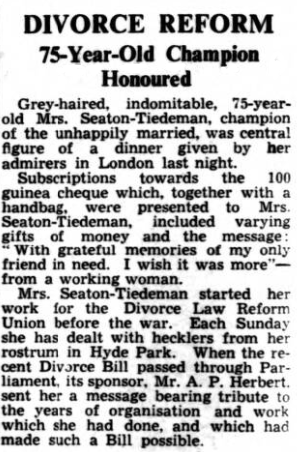
Even after the 1937 Act was passed, Seaton-Tiedeman and the Divorce Law Reform Union continued to agitate for further changes to the law, feeling that they must continue ‘till other grounds [for divorce] were permitted.’ Seaton-Tiedeman was also active in efforts to repeal British blasphemy laws, including as part of the Society for the Abolition of Blasphemy Laws. In areas of obscenity too, she brought her humanism to bear on arguments concerning sex and science. In 1935, she testified for the defence in the obscenity trial of Edward Charles’ An Introduction to the Study of the Psychology and Physiology and Bio-Chemistry of the Sex Impulse among Adults in Mental and Bodily Heath. Seaton-Tiedeman defended the work which included ‘an exposition of coital technique intended for the ordinary educated man and woman’, on the grounds of its usefulness to married couples. Seaton-Tiedeman stated that:
in the light of fifty years’ experience as a social worker, during the last twenty-three years of which she had had a special acquaintance with wrecked marriages as Honorary Secretary of the Divorce Law Reform Union, she considered the book of immense value for the preservation of marriage.
In November 1938, May Seaton-Tiedeman told a reporter for the Daily Herald that she had ‘worked for justice’ all her life:
My husband, my family, think I’m mad. They’re sympathetic, of course, but they think I ought to give it up now. I shall go on until I have nothing left.
Seaton Tiedeman retired during the Second World War, and died on 22 October 1948.
The year after her death, a memorial meeting, led by H.J. Blackham, was held at Conway Hall, recalling Seaton-Tiedeman’s rich life as an ‘energetic worker’ for reform and an ‘enthusiastic supporter of the Ethical Movement and other humanist activities’. Two decades later, Lord Chorley recalled her work in a House of Lords Debate on the Divorce Law Reform Bill of 1969:
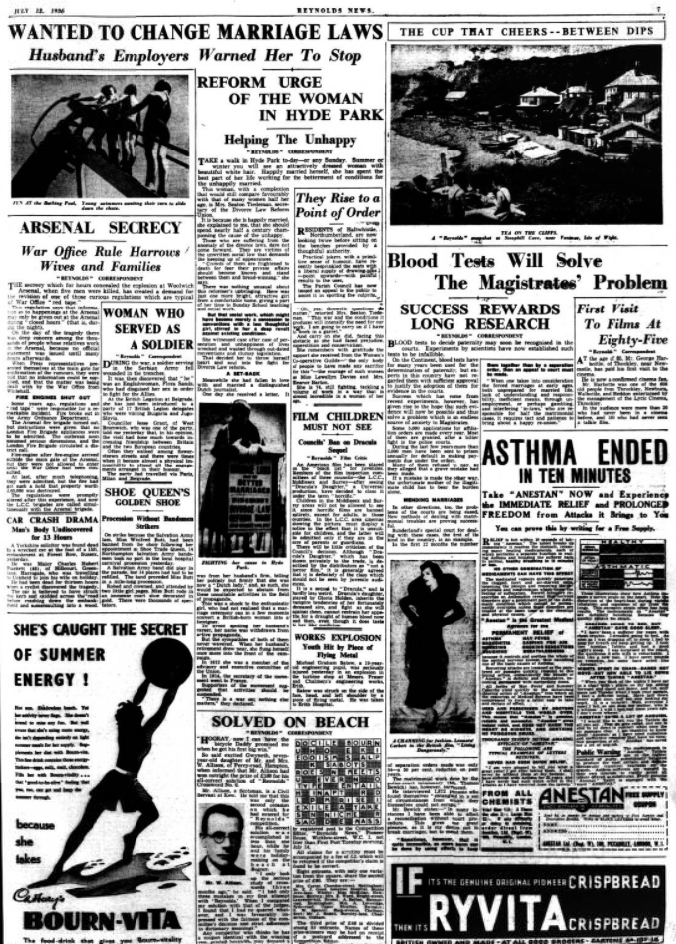
But long before that, the Divorce Law Reform Society (I think it was called) had been formed and run by a Mrs. Seaton Tiedeman, who was a woman of tremendous dynamism and drive. At a time when the interest in divorce law reform was very lukewarm through the country she did work which I think we should all look back upon… Mrs. Seaton Tiedeman was a woman who gave up the whole of her spare time and energies and carried the banner of this movement up and down the country in the most selfless and tireless way. I like to look back upon the very short association I had with her with a good deal of pride.
May Seaton-Tiedeman tirelessly championed the causes she believed in, even in the face of ‘lukewarm’ or outright antagonistic responses from others. She was driven by a firm sense of right, arrived at through reason and empathy, and well-supported by the wider humanist movement of which she was so central a part. Today, Humanists UK continue the work to advocate for secular, sensible, and compassionate laws, as direct descendants of Seaton-Tiedeman and her colleagues in the early Ethical movement.
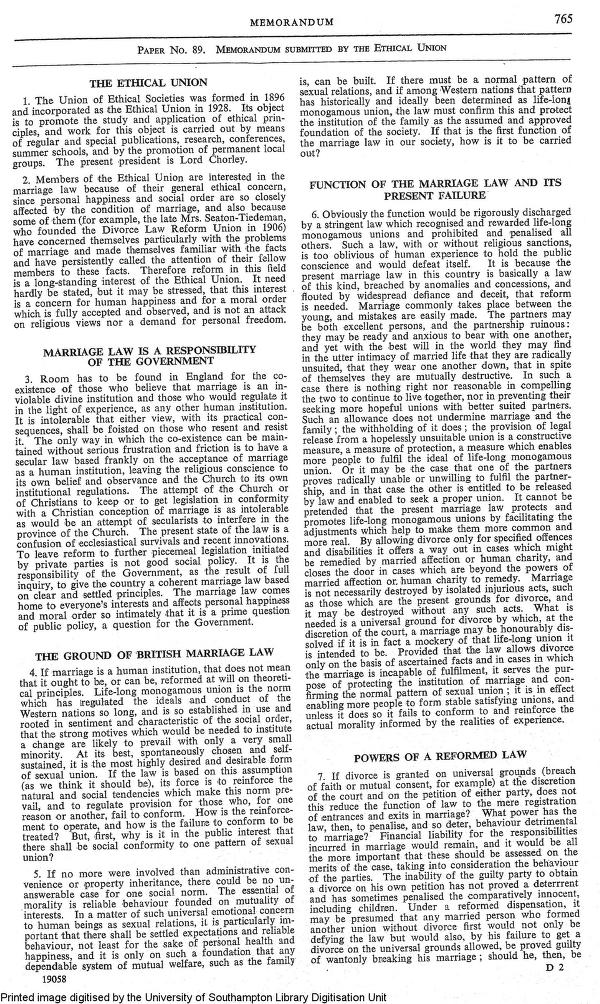
In November 1951, the Ethical Union (now Humanists UK) submitted a memorandum for a Royal Commission on Marriage and Divorce. Three leading figures in the Union, H.J. Blackham, Virginia Flemming (the daughter of Stanton Coit), and A.F. Dawn, were called and examined as witnesses. Point two of the document makes specific reference to the example of May Seaton-Tiedeman and the historic role of humanists in campaigning for the reform of divorce laws.
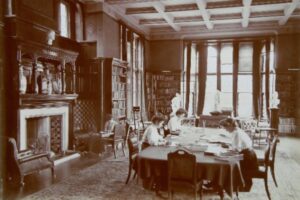
The Universities Tests Act, which ended religious discrimination in admissions and employment at the universities of Oxford, Cambridge, and Durham […]
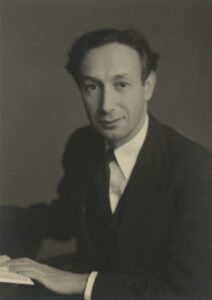
In common with other humanists, I believe that the only possible basis for a sound morality is mutual tolerance and […]
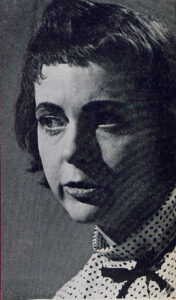
We are (of all the synonyms I most prefer to ‘humanist’) freethinkers. We are deprived of nothing. We have lost […]
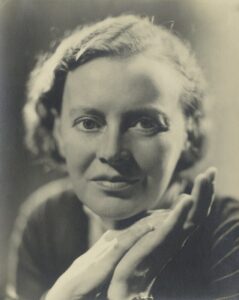
I hold that a writer should not in any circumstances or for any cause surrender his duty to criticise and […]